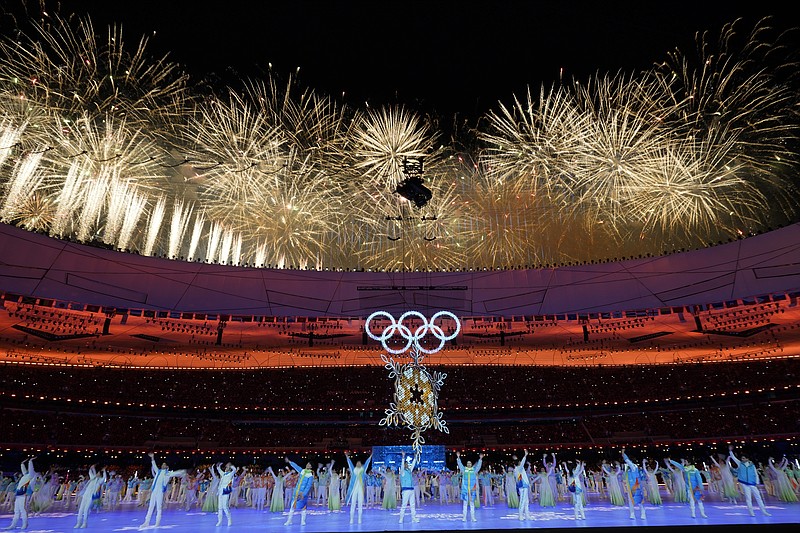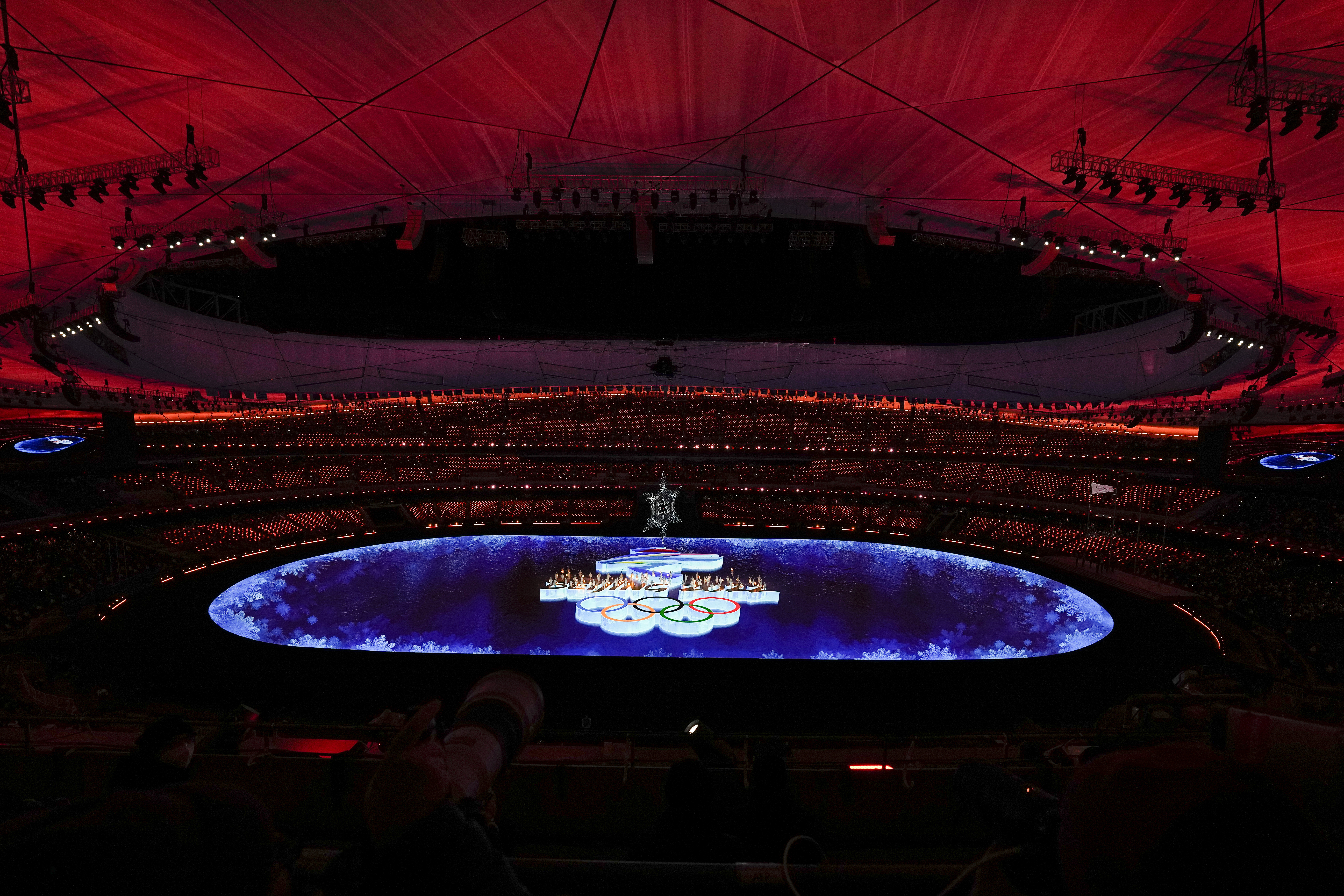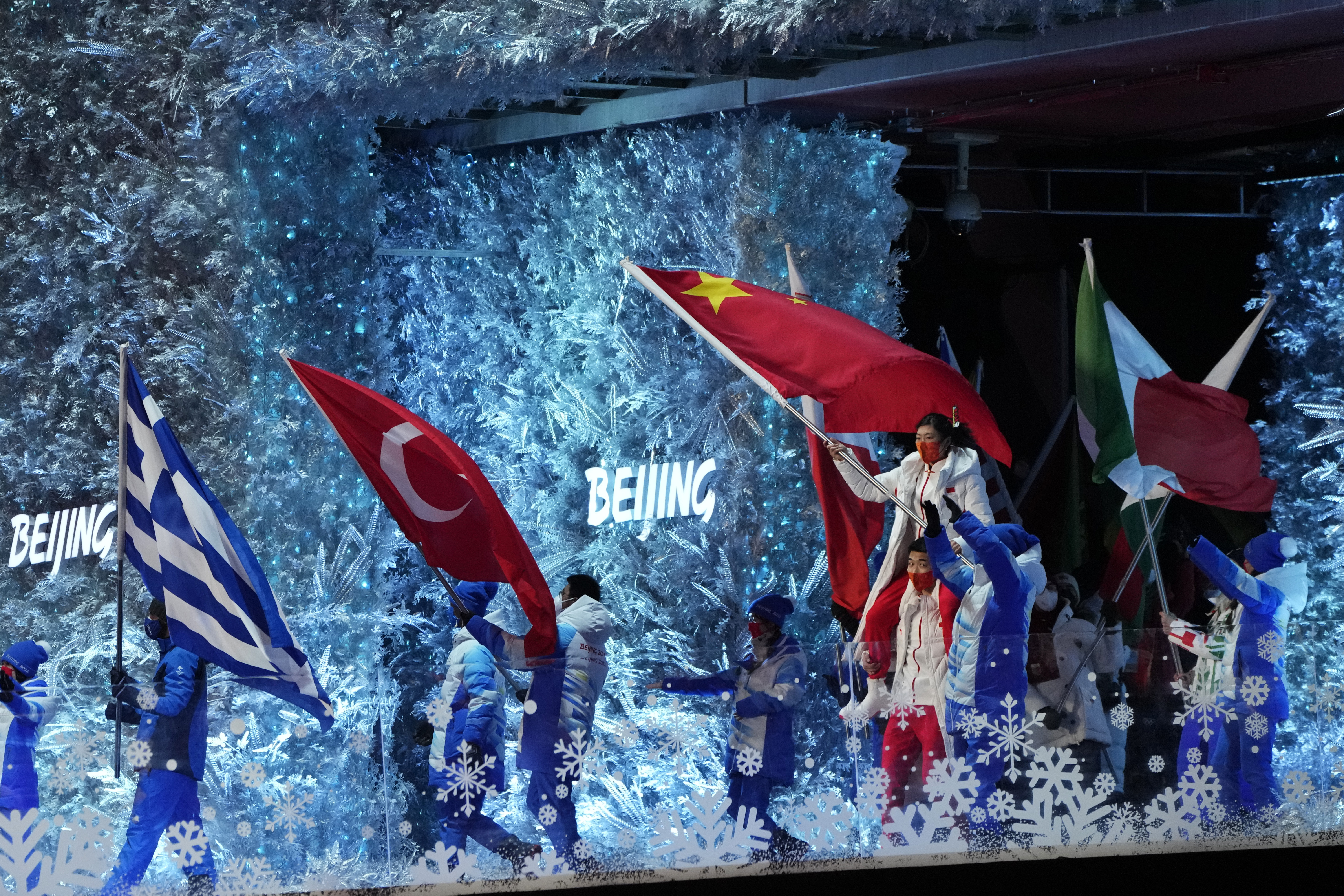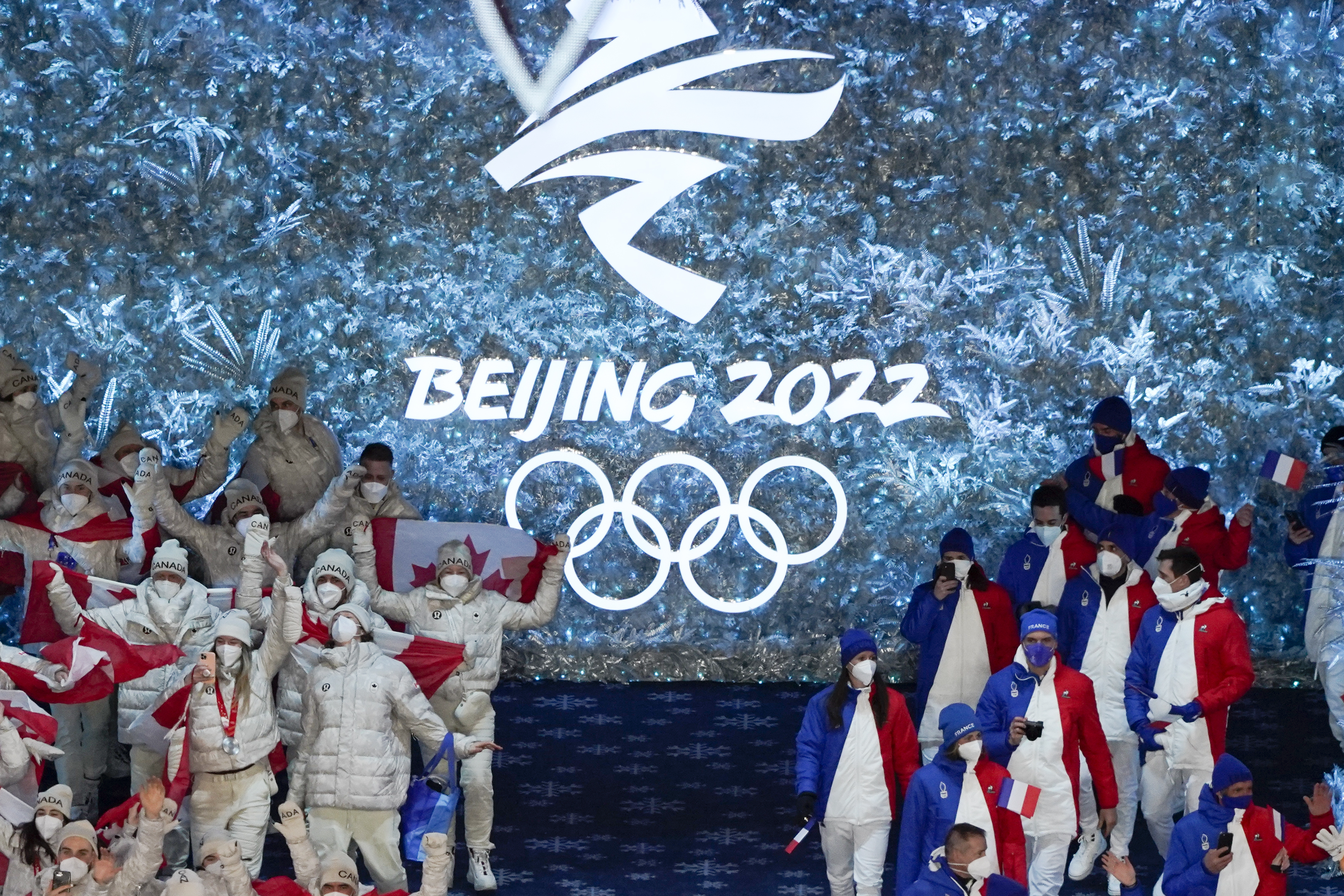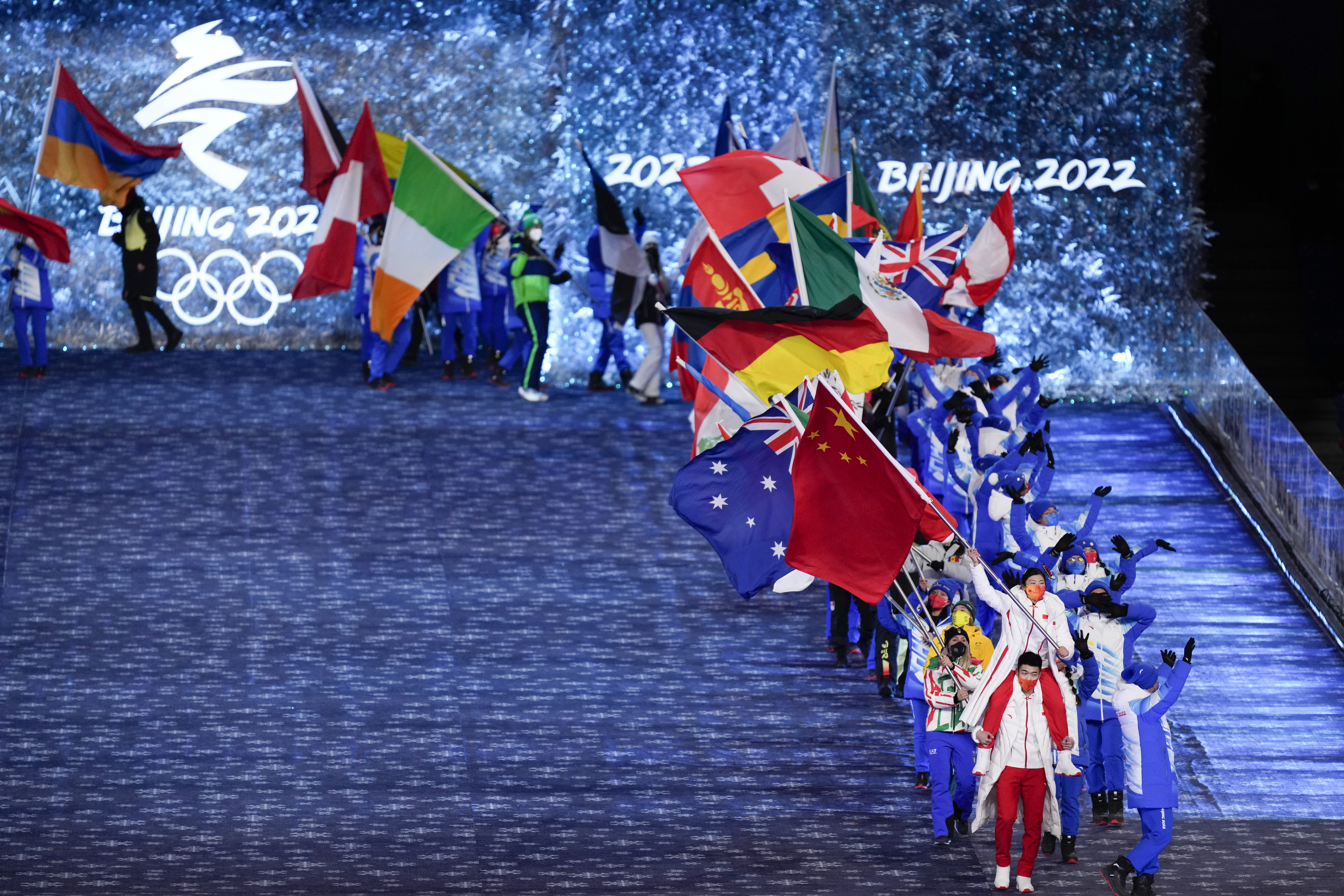BEIJING -- A pile of figure-skating rubble created by Russian misbehavior. A new Chinese champion -- from California. An ace American skier who faltered and went home empty-handed. The end of the Olympic line for the world's most renowned snowboarder. All inside an anti-covid "closed loop" enforced by China's authoritarian government.
The terrarium of a Winter Games that has been Beijing 2022 came to its end Sunday, capping an unprecedented Asian Olympic trifecta and sending the planet's most global sporting event off to the West for the foreseeable future, with no chance of returning to this corner of the world until at least 2030.
It was weird. It was messy and, at the same time, somehow sterile. It was controlled and calibrated in ways only Xi Jinping's China could pull off. And it was sequestered in a "bubble" that kept participants and the city around them -- and, by extension, the sporadically watching world -- at arm's length.
On Sunday night, Xi and International Olympic Committee President Thomas Bach stood together as Beijing handed off to Milan-Cortina, site of the 2026 Winter Games. "Twinkle, Twinkle, Little Star" kicked off a notably Western-flavored show with Chinese characteristics as dancers with tiny, fiery snowflakes glided across the stadium in a ceremony that, like the opening, was headed by Chinese director Zhang Yimou.
Unlike the first pandemic Olympics in Tokyo last summer, which featured all but empty seats at the opening and closing, a modest but energetic crowd populated the seats of Beijing's "Bird's Nest" stadium. It felt somewhat incongruous -- a show bursting with color and energy and enthusiasm and even joy, the very things that couldn't assert themselves inside China's covid bubble.
"We welcome China as a winter sport country," Bach said, closing the Games. He called their organization "extraordinary" and credited the Chinese and their organizing committee for serving them up "in such an excellent way and a safe way."
By many mechanical measures, these Games were a success. They were, in fact, quite safe -- albeit in the carefully modulated, dress-up-for-company way that authoritarian governments always do best. The local volunteers, as is usually the case, were delightful, helpful and engaging, and they received high-profile accolades at the closing.
There was snow -- most of it fake, some of it real. The venues -- many of them, like the Bird's Nest and the Aquatic Center, harvested from the 2008 edition of the Beijing Olympics -- performed to expectations. One new locale, Big Air Shougang, carved from a repurposed steel mill, was an appealingly edgy mashup of winter wonderland and rust-belt industrial landscape.
TV ratings were down, but streaming viewership was up: By Saturday, NBC had streamed 3.5 billion minutes from Beijing, compared to 2.2 billion in South Korea in 2018.
There were no major unexpected logistical problems, only the ones created deliberately to stem the spread of covid in the country where the coronavirus first emerged more than two years ago.
And stemmed it seemed to be. As of Saturday, the segregated system that effectively turned Beijing into two cities -- one sequestered, one proceeding very much as normal -- had produced only 463 positive tests among thousands of visitors entering the bubble since Jan. 23. Not surprisingly, the state-controlled media loved this.
"The success in insulating the event from the virus and keeping disruption to sports events to a minimum also reflected the effectiveness and flexibility of China's overall zero-covid policies," the pro-government Global Times newspaper said, citing epidemiologists who say "the covid-19 prevention experience accumulated from this Olympics can also inspire Chinese cities to adjust their policies."
And then, of course, there were the Russians. And doping. Again.
The 15-year-old Russian figure skater Kamila Valieva tested positive for using a banned heart medication. The result wasn't announced by anti-doping officials until after she'd won gold as part of the team competition, even though the sample was taken weeks earlier.
The Court of Arbitration for Sport cleared her to compete in the individual discipline, ruling that as a minor she had protected status. But Valieva, although heavily favored to win, fell several times during her free skate routine, landing her fourth place and prompting a cold reception from her embattled coach, Eteri Tutberidze.
"Rather than giving her comfort, rather than to try to help her, you could feel this chilling atmosphere, this distance," Bach said the next day, proclaiming his outrage.
Valieva's Russian teammates took gold and silver, but on a night of drama, even the winners were in tears. The affair produced one possible legacy for Beijing: Valieva's ordeal has inspired talk of raising the minimum age for Olympic skaters from 15 to 17 or 18.
American skier Mikaela Shiffrin also came to Beijing with high expectations, only to see them dashed when she failed to finish three races. She left without any medal at all. In an image to remember, the TV cameras captured Shiffrin sitting dejectedly on the snow, head in hands, for several minutes.
The 2022 Games were controversial from the moment the IOC awarded them to Beijing, the frequently snowless capital of a country without much of a winter sports tradition. Almaty, Kazakhstan, was the only other city in play after four other bids were withdrawn due to lack of local support or high cost.
Geopolitical tensions also shadowed these Games, with Russia's buildup of troops along its border with Ukraine spurring fears of war in Europe even as the "Olympic Truce" supposedly kicked in. In the closing, Bach said athletes "embraced each other even if your countries are divided by conflict," an apparent reference to a hug captured on camera between a Russian athlete and a Ukrainian one.
China swelled with pride, and its social media swelled with comments, as Eileen Gu, an America-born freestyle skier who chose to compete for China, her mother's native country, became an international superstar. Her three medals -- two gold, one silver -- set a new record for her sport, and adulation for Gu literally broke the Chinese internet at one point, briefly crashing the servers of Sina Weibo, the massive Twitter-like network.
And Chinese snowboarder Su Yiming, a former child actor, won over the home crowd with a dominant gold medal big air performance.
HOCKEY
Finns' get the gold
Hannes Bjorninen scored the go-ahead goal 31 seconds into the third period and Finland claimed its first Olympic men's hockey gold medal with a 2-1 win over the Russian Olympic Committee on the final day of the Beijing Games.
Ville Pokka also scored and Harri Sateri stopped 16 shots as Finland rallied from a 1-0 first-period deficit. The Finns' best finishes in 17 previous Olympic appearances were silver medals at the 1988 Calgary Games and 2006 Torino Games.
Mikhail Grigorenko scored for the favored Russian team, the defending champions, in the second consecutive tournament without NHL players. The Russians won 4-3 over Germany in overtime in the gold-medal final at the 2018 Pyeongchang Games.
Ivan Fedotov stopped 29 shots for the ROC.
Finland completed the tournament with a 7-0 record.
CROSS COUNTRY SKIING
Diggins earns a silver
Cross-country skier Therese Johaug of Norway won the women's 30-kilometer mass start, her third gold at the Beijing Olympics.
Fighting fierce winds and brutal temperatures, she went out front early in the race and held on, finishing in 1 hour, 24 minutes and 54 seconds. Johaug also won the skiathlon and 10-kilometer classic race.
American Jessie Diggins kept a steady pace behind the Norwegian as gusts whipped across the tracks, battering the skiers. She crossed the finish line 1 minute and 43.3 seconds behind Johaug to win silver. She had already become the first American woman to win an individual cross-country medal when she took bronze in the sprint earlier in the Beijing Games.
Finland's Kerttu Niskanen won bronze 2 minutes and 33.3 second back.
